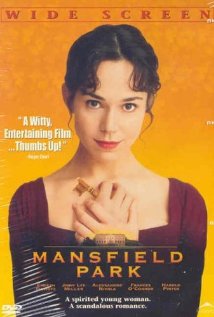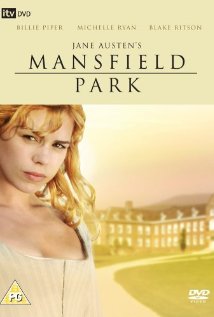 This past weekend I joined several Washington Romance Writer (WRW) friends at the home of Kathleen Gilles Seidel to watch two film versions of Mansfield Park: The 1999 version with Frances O’Connor and Johnny Lee Miller; and the 2007 TV version with Billie Piper and Blake Ritson. Kathy had invited us to watch the movies with her, because she is scheduled to give a talk about Mansfield Park at WRW’s January meeting next Saturday. Also in preparation for Kathy’s talk, I am rereading Mansfield Park and am about halfway through.
This past weekend I joined several Washington Romance Writer (WRW) friends at the home of Kathleen Gilles Seidel to watch two film versions of Mansfield Park: The 1999 version with Frances O’Connor and Johnny Lee Miller; and the 2007 TV version with Billie Piper and Blake Ritson. Kathy had invited us to watch the movies with her, because she is scheduled to give a talk about Mansfield Park at WRW’s January meeting next Saturday. Also in preparation for Kathy’s talk, I am rereading Mansfield Park and am about halfway through.
Kathy Seidel’s annual Jane Austen-related talk is a WRW highlight for me. Kathy is an Austen scholar, having written her Ph.D. dissertation on Austen, but she is also hugely entertaining and her talks are always intelligent, stimulating and useful for writers. More on her Mansfield Park talk next week.
 We’ve discussed the Mansfield Park movies here at Risky Regencies before, most recently after the 2007 TV version was released, and most of us have generally thought the movies pretty dreadful. The WRW group was no different. The 1999 version was particularly abysmal, having very little to do with the book and having almost none of Austen’s sensibilities included. The 2007 version did not change the story quite as drastically, but when it did, it changed it in incomprehensible ways that made no sense at all. In both versions, the main characters were changed very drastically–except for Mary and Henry Crawford, the worldly brother and sister who come for an extended visit. The Crawfords are often described as the most interesting characters in the book.
We’ve discussed the Mansfield Park movies here at Risky Regencies before, most recently after the 2007 TV version was released, and most of us have generally thought the movies pretty dreadful. The WRW group was no different. The 1999 version was particularly abysmal, having very little to do with the book and having almost none of Austen’s sensibilities included. The 2007 version did not change the story quite as drastically, but when it did, it changed it in incomprehensible ways that made no sense at all. In both versions, the main characters were changed very drastically–except for Mary and Henry Crawford, the worldly brother and sister who come for an extended visit. The Crawfords are often described as the most interesting characters in the book.
The Fanny and Edmund of the book are very unlike the heroine and hero we would expect in a book of romantic fiction today.
Fanny is timid, self-effacing, and long-suffering, but she is the moral compass of the book, the one character who consistently acts in a principled manner. In other words, she doesn’t change in the book. She stands firm, no matter what happens to her. This was obviously Austen’s vision for Fanny, but I think today’s reader wants heroines who strive actively to reach their goals, not ones who merely endure what happens to them.
Edmund shares Fanny’s view of morality, but he is very easily swayed by the manipulations and allure of Mary Crawford. That is not the sort of hero who interests me. I want my hero to be strong enough and wise enough to see through the clever manipulations of others, and I do not want him to be tempted to fall in love with a character who is not the heroine.
At the end of the book (or the movies) you are glad Fanny and Edmund wind up together, but it was hard to feel strongly enough about either of them to actually root for them to wind up together.
I was thinking that today’s romance novelist would probably choose Mary and Henry Crawford as more likely candidates to be hero or heroine. Now those are two characters who could do with a strong character arc. Do you know if anyone has written such a version?
What do you think are the most important elements in a hero or heroine?
I also watched the first episode of season three of Downton Abbey. It occurred to me that one of the reasons that the series is so successful is that all of the characters are interesting and all have ways they can change, ways we can root for them.
